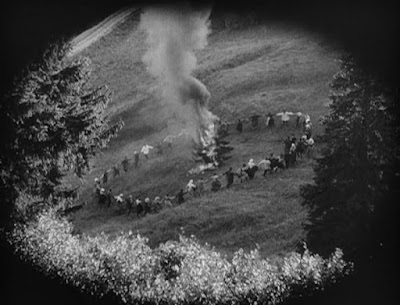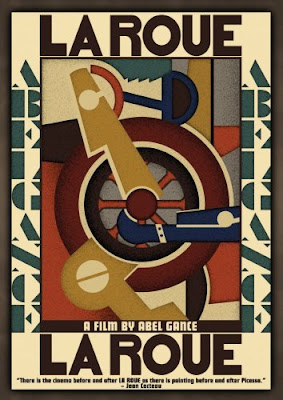A scene from Abel Gance's epic drama 'La Roue' (1923).The time has come, or is at least close upon us.
On Saturday, Sept. 28, starting at noon I'll attempt to create music for Able Gance's neglected masterwork 'La Roue' (1923)—all seven hours of it, all in one marathon screening.
The venue is the Brattle Theatre in Cambridge, Mass. Tickets are $25 per person for this immersive cinematic experience, which will run from noon to about 8:30 p.m.
Lots more info in the press release pasted in below. And here's few notes prior to the event.
I don't know how this will unfold, but I'm eager to find out. Most of all, I'm looking forward to seeing where the music goes.
I find that in scoring silent films, it helps to have room to develop the musical material over time. Well, I'll have plenty of that for 'La Roue.'
Also, I plan to play continuously during two of the intermissions scheduled for the screening, as I don't want to break out of the "silent film zone" I get into when working with a film.
And yes, playing music for seven hours is something of a stunt.
But I've been working at the craft of creating live music for silent cinema for nearly 20 years, and I feel ready to tackle one of the largest cinematic mountains to climb, so to speak.
Why do it? The answer is the same as in mountaineering: Because it's there!
And I hope you'll be there as well as we attempt the summit one of silent cinema's highest peaks.
* * *
Silent film accompanist Jeff Rapsis will play music for Abel Gance's 'La Roue' on Saturday, Sept. 28.TUESDAY, SEPT. 17, 2024 / FOR IMMEDIATE RELEASE
Contact Jeff Rapsis • (603) 236-9237 • jeffrapsis@gmail.com
At the Brattle: Silent film musician to play for seven hours to accompany rarely seen masterwork
Abel
Gance's immersive epic 'La Roue' (1923) to be screened on Saturday,
Sept. 28 with three intermissions as part of 'Silent Movie Weekend'
CAMBRIDGE,
Mass.—No sheet music will be at the keyboard when Jeff Rapsis sits down
to accompany 'La Roue' (1923) on Saturday, Sept. 28 at the Brattle
Theatre.
That's because he'll be improvising an original score for the rarely screened French silent masterwork—all seven hours of it.
Starting
with the opening titles of 'La Roue' at noon, Rapsis will continually
make up music on the spot until 'Fin' appears on screen at about 8:30
p.m.
"It's a different kind of Boston
marathon," said Rapsis, a New Hampshire-based musician who specializes
in live accompaniment of silent film screenings.
The
screening is part of a 'Silent Movie Weekend' at the Brattle, which
will screen vintage classics from Friday, Sept. 27 through Monday, Sept.
30.
The programming is the Brattle's extended salute to this year's 'Silent Movie Day,' which falls on Sunday, Sept. 29.
This
year's tribute will be highlighted by a rare complete screening of 'La
Roue,' a drama directed by visionary French filmmaker Abel Gance.
Admission
is $25 per person for the all-day screening, which includes two
intermissions plus a brief dinner break at the halfway point.
Through
it all, Rapsis will create music intended to bring Gance's vision to
life for modern audiences, a century after the film's Paris premiere.
"People
are surprised to learn that it's possible to improvise a film score for
a movie of any length, never mind one that's seven hours long," Rapsis
said.
"But the extraordinary running time of 'La Roue' can allow the music to go places it usually doesn't," he said.
'La Roue' (French for
'the wheel') tells the story of Sisif, a railroad engineer who adopts an
orphaned girl following a train accident.
The ensuing
decades bring both joy and tragedy in a film that has been compared to a
Dickens novel as the story evolves and action plays out over time.
Along
the way, Gance filmed sequences in French locations ranging from the
grimy railyards of Nice to the snow-covered slopes of Mont Blanc.
The lead role of Sisif, the railway engineer, is played by noted French actor
Séverin-Mars, who died of a heart attack just after Gance finished principal photography.
"It's a movie that is by turns ambitious, ground-breaking, extravagant,
self-indulgent, audacious, and revolutionary," Rapsis said.
Rapsis keeps alive the nearly lost art of live
silent film accompaniment by performing at more than 100 screenings a
year, many of them in Boston-area venues.
During
the silent era, most movies did not have official scores. Instead,
local theater musicians played anything they felt helped a film, often
with little advance preparation.
The music would differ from theater to theater, all over the nation and around the world.
It
was only later, after soundtracks were introduced, that directors began
working with composers to create film scores as we know them today.
"Back
then, live music was a big part of the movie-going experience—and it
was made locally, just like the popcorn is today," Rapsis said.
Unlike musicians of the silent era, Rapsis uses a digital synthesizer to create music with the sound of a full orchestra.
"Depending
on the mood and setting, I can call up really any kind of texture that I
feel helps support the film on screen," Rapsis said.
In
nearly 20 years of accompanying films, Rapsis has become familiar with
titles most often requested: Buster Keaton comedies, thrillers starring
Lon Chaney, and Biblical epics from Cecil B. DeMille.
"For
most screenings, I don't prepare in advance other than perhaps running
the film fast-forward to remind me of the overall story," Rapsis said.
"For
the most part, the music for each screening is created right there in
the theater—to support the film, but also in response to audience
reaction."
Rapsis said an experienced
accompanist supports the movie, but can also help modern audiences
"read" a film from the silent era, when stories often unfolded visually
and without dialogue.
"Today's audiences may
not be used to this. If done right, the music can indicate a shift in
mood or tension to confirm that something significant has just happened
on screen," Rapsis said.
There are also practical realities of accompaniment that can affect an audience's enjoyment of a film.
"For
comedies, it's very important to play quietly at first, so that
audience members can hear each other laughing," Rapsis said.
"Hearing
people laugh often triggers laughter in others, which can lead to a
theater full of people roaring at a classic silent film comedy."
"But if the music is too loud, that spontaneous combustion of laughter can't happen," Rapsis said.
Rapsis will put his two decades of experience to work in accompanying 'La Roue.'
Although the music will be improvised, Rapsis is developing a few
ideas in advance that he'll weave together to create the score.
"I plan to draw from
this bank of material," Rapsis said. "But I find that if I spend too
much time making elaborate plans or studying a film, it interferes with
the music that comes to me in the moment, in the theater, when the film
is on the screen."
"It's harder to forget about everything and get immersed in the film, which is when the best stuff tends to happen."
Other than that, he's undertaking no special preparations for
the seven-hour screening, other than reviewing the story line and
adding extra miles to his bicycle rides.
"I
think I'm up for it, at least physically," he said. "If nothing else, I
have endurance. I'm like the Jake LaMotta of silent film
accompaniment—it may not be pretty, but I just keep on coming."
Rapsis admits that the process is "a bit of a
high wire act," but says creating live music on the fly can add a
distinctive element to the silent movie experience.
"With
improvised live accompaniment, a certain energy and excitement comes
through that's different from a score that's planned in advance, or
recorded," he said.
A scene from 'La Roue' (1923), directed by Abel Gance.
In making 'La Roue,' director Gance aimed to explore the limits of movie making, then a still-new art form.
Among
Gance's on-screen innovations are complicated optical effects, rapid
cutting during climactic sequences, and extended visual symbolism.
'La Roue' was Gance's last major project prior to starting work on
'Napoleon' (1927), which would turn out to be his magnum opus that would
go on to overshadow his other work. This includes 'La Roue,' a film
that was no less ambitious or accomplished, but which has been neglected
in comparison.
Recently restored to Gance's original 1923 cut, the complete 'La Roue' clocks in at 6 hours and 52 minutes.
For
the Brattle screening, 'La Roue' will be divided into two parts. Part 1
will include a brief intermission about halfway through. A dinner break
will follow.
For Part 2, another intermission will occur about halfway through. The screening will conclude at about 8:30 p.m.
"It's a rare chance to see 'La Roue' the way Gance intended it to be
experienced: in a theater, on the big screen, with live music, and with
an audience," Rapsis said.
Abel Gance's silent masterwork 'La Roue' (1923) will
be shown in its entirety with live music on Saturday, Sept. 28 starting
at noon at the Brattle Theatre, 40 Brattle St., Cambridge, Mass.
Tickets are $25 per person; purchase online at
www.brattlefilm.org or in person at the theater's box office. For more information, call (617) 876-6837.


















